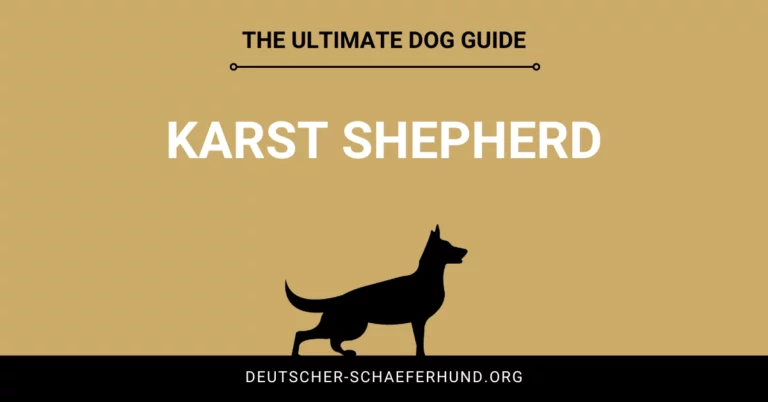Introduction
The Karst Shepherd is a magnificent dog breed hailing from the Karst Plateau, an area spanning Slovenia and Italy. They are known for their robustness, strong work ethic, and loyal nature, making them perfect companions for those who appreciate their many qualities. Named after the region where they were first discovered, these dogs were primarily used by local shepherds for herding and protecting livestock. They have a rich history dating back hundreds of years, and despite their rare status, they are cherished in their homeland and around the world for their distinctive characteristics.
| Characteristic | Detail |
|---|---|
| Origin | Slovenia and Italy (Karst Plateau) |
| Size | Medium to Large |
| Weight | Males: 30-42kg, Females: 25-37kg |
| Coat and Colors | Dense, weather-resistant, iron gray to brown |
| Lifespan | 10-12 years |
| Temperament | Loyal, protective, reserved with strangers |
| Training | Requires consistent, firm, but gentle training |
| Exercise Needs | High; requires regular exercise |
| Health Issues | Generally healthy, prone to hip dysplasia |
| Diet | High-quality commercial dog food |
| Grooming | Regular brushing, occasional baths, frequent nail trims |
| Suitable Living Conditions | Needs plenty of space, not suited for apartment living |
| Roles | Herding, guarding livestock, search and rescue, therapy work |
Physical Characteristics of the Karst Shepherd
Size and Weight
Typically, Karst Shepherds are medium to large-sized dogs. Males generally weigh between 30 to 42 kg, while females range from 25 to 37 kg. They are well-built and muscular, perfect for their traditional role as working dogs.
Coat and Colors
Their coat is dense and weather-resistant, with colors that range from iron gray to brown. They have a mane around their neck, giving them a lion-like appearance.
Lifespan and Health
The Karst Shepherd has a lifespan of approximately 10 to 12 years. They are generally healthy dogs but, like all breeds, they can be prone to certain health conditions.
Personality and Temperament of the Karst Shepherd
General Behavior
Known for their loyalty and alertness, Karst Shepherds are excellent protectors. They can be wary of strangers but are exceptionally loving and loyal to their families.
Interaction with Family Members
With their family, these dogs are gentle, protective, and excellent with children. They form strong bonds with their human companions and enjoy being part of the family’s everyday activities.
Interaction with Other Pets
While they can be reserved with other dogs, they usually get along well with the pets they have been raised with. Early socialization is key for a well-adjusted and confident Karst Shepherd.
Training and Exercise for Karst Shepherd
Training Requirements
Karst Shepherds are intelligent dogs and respond well to training, especially when positive reinforcement methods are used. They need consistent, firm, but gentle guidance.
Exercise Needs
Being an active and robust breed, these dogs require regular exercise to keep them fit and happy. This can include long walks, runs, or play sessions in a secure area.
Tips for Training a Karst Shepherd
Start training and socializing your Karst Shepherd from an early age. Patience, consistency, and a positive, reward-based approach work best for this breed.
Karst Shepherd Health and Wellness
Common Health Issues
While generally healthy, Karst Shepherds can be prone to certain breed-specific conditions like hip dysplasia. Regular health check-ups with a vet can help identify and manage any potential health issues early on.
Diet and Nutrition
A balanced diet is crucial for this breed. They do well on high-quality commercial dog food, but be careful not to overfeed them as they can be prone to obesity.
Regular Vet Check-ups
Regular vet visits are essential for the health of your Karst Shepherd. This ensures they get the necessary vaccinations and early detection of any potential health problems.
Grooming Your Karst Shepherd
Coat Maintenance
Karst Shepherds have a thick coat that requires regular brushing to keep it free from mats and tangles. They are moderate shedders, so grooming can help manage this.
Bathing and Nail Trimming
Bathing is needed only occasionally. Nail trimming, however, should be done regularly to prevent overgrowth and the problems that can occur with it.
Teeth and Ear Care
Regular teeth brushing and ear cleaning can help prevent dental disease and ear infections, common problems in many dog breeds.
Living Conditions for the Karst Shepherd
Suitable Living Environments
Karst Shepherds need a home with plenty of space to move around. They are not well-suited to apartment living due to their size and exercise needs.
Adaptability to Weather Conditions
Thanks to their thick coat, they are well-adapted to cooler climates. In warmer areas, they will need access to shade and plenty of water to stay comfortable.
The Karst Shepherd as a Working Dog
The Karst Shepherd in Herding
Historically, Karst Shepherds have been used for herding and guarding livestock. They excel in these roles due to their protective nature and high energy levels.
Other Roles in Work Settings
Besides herding, these dogs can also be trained for various roles, including search and rescue, therapy work, and dog sports like obedience and agility.
Adaptability in Non-Working Settings
While they thrive in working environments, with the right training and socialization, they can also adapt well to family life, making excellent companions.
Tips for Potential Karst Shepherd Owners
Understanding the Responsibilities
Owning a Karst Shepherd comes with substantial responsibilities. They require time, commitment, and an understanding of the breed’s needs and characteristics.
Cost of Ownership
The cost of owning a Karst Shepherd can vary, but potential owners should consider expenses like food, vet care, grooming, training, and any necessary health treatments.
Where and How to Find a Reputable Breeder
Finding a reputable breeder is crucial. Look for breeders who prioritize the health and temperament of their dogs, and who provide appropriate health clearances.
Breed Recognition of the Karst Shepherd
International Recognition
Despite its rarity, the Karst Shepherd has been recognized by several international kennel clubs and organizations. These include the Federation Cynologique Internationale (FCI), United Kennel Club (UKC), and The Kennel Club (UK). However, as of my knowledge cut-off in September 2021, the breed is not yet recognized by the American Kennel Club (AKC).
Karst Shepherd’s Role in Popular Culture
Presence in Media
Due to its relative obscurity, the Karst Shepherd has not been featured prominently in popular culture. However, as interest in the breed grows, one can expect to see more of these majestic dogs in media and entertainment.
Adopting a Karst Shepherd
Adoption versus Buying
Adopting a Karst Shepherd from a rescue organization can be a rewarding experience. This gives a dog a second chance at a loving home, and it can also be a more affordable option than buying a puppy from a breeder. However, it’s essential to ensure that you’re fully prepared to provide a suitable home for an adopted dog, as some may come with behavioral issues or special needs.
The Karst Shepherd in Competitions
Competitive Abilities
With their intelligence, agility, and energy, Karst Shepherds can excel in various competitive activities. These can include obedience trials, agility competitions, herding trials, and even tracking events. Participation in such events can provide excellent mental and physical stimulation for the dog and can be a fun and rewarding experience for the owner.
Conclusion
The Karst Shepherd is a unique, robust, and loyal breed. Their physical strength, coupled with their intelligent and protective nature, make them excellent working dogs and loyal companions. The ideal Karst Shepherd owner is active, patient, and committed to providing the right training, care, and environment for their dog. In the right home, a Karst Shepherd will thrive, proving to be a loving and protective member of the family.



